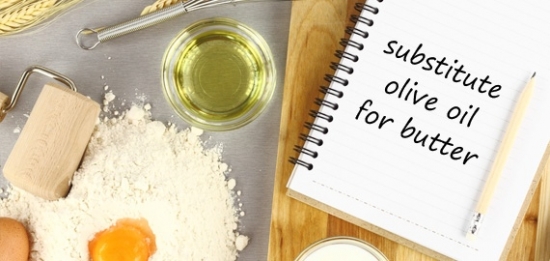Olive Oil and Heart Health
Olive oil is an integral part of the Mediterranean diet, whose followers have documented lower rates of heart disease. Besides being a rich source of monounsaturated fats (1 tablespoon of olive oil contains 9.9 g monounsaturated fatty acids, 1.9 g saturated fatty acids, and 1.4 g polyunsaturated fatty acids), olive oil is also rich in polyphenols. Nevertheless, fats are the most concentrated form of energy, and calorically are equal at 9 calories per gram. Olive oil is no exception: 1 tablespoon clocks in at 120 calories. While using olive oil does supply beneficial fats and polyphenols, we still have to "budget" where to use it. Instead of using more oil in the kitchen, you can substitute olive oil for some of the regular fats used in baking.
Substitute Olive Oil for Other Cooking Oils (Even Butter)
You can use olive oil to replace other cooking oils, including butter. However, when used in baking, because olive oil is a liquid oil, a recipe that calls for a solid fat such as butter will need some adjustment:
Carol Firenze, author of the book The Passionate Olive, gives the following adjustments for baking with olive oil.
| Butter | Margarine Olive Oil |
| 1 teaspoon | 3/4 teaspoon |
| 1 tablespoon | 2 1/4 teaspoons |
| 1/4 cup | 3 tablespoons |
| 1/3 cup | 1/4 cup |
| 1/2 cup | 1/4 cup + 2 tablespoons |
| 2/3 cup | 1/2 cup |
| 3/4 cup | 1/2 cup + 1 tablespoon |
| 1 cup | 3/4 cup |
If you are not sure about replacing all the solid fat in a recipe with olive oil, experiment with using half of the butter called for in the recipe, and substitute the appropriate equivalent of olive oil for the other half.
Keep in mind that some recipes would not do well with liquid oil because the solid structure of the fat is needed for the texture, such as cake frosting, pastry or pie crust, and biscuits. Some cookie recipes can be adjusted to use olive oil as a substitute, but the taste will be different.


